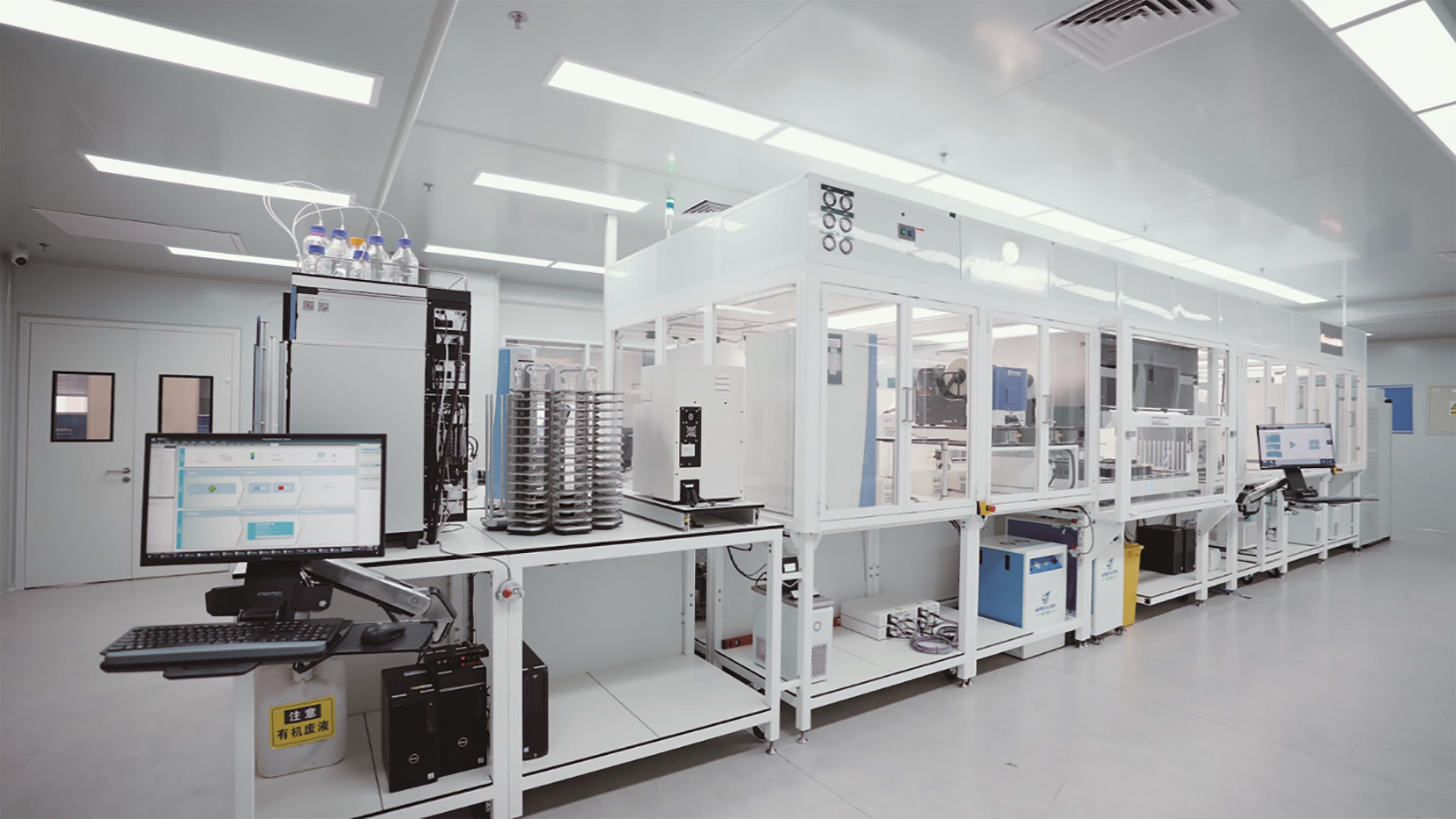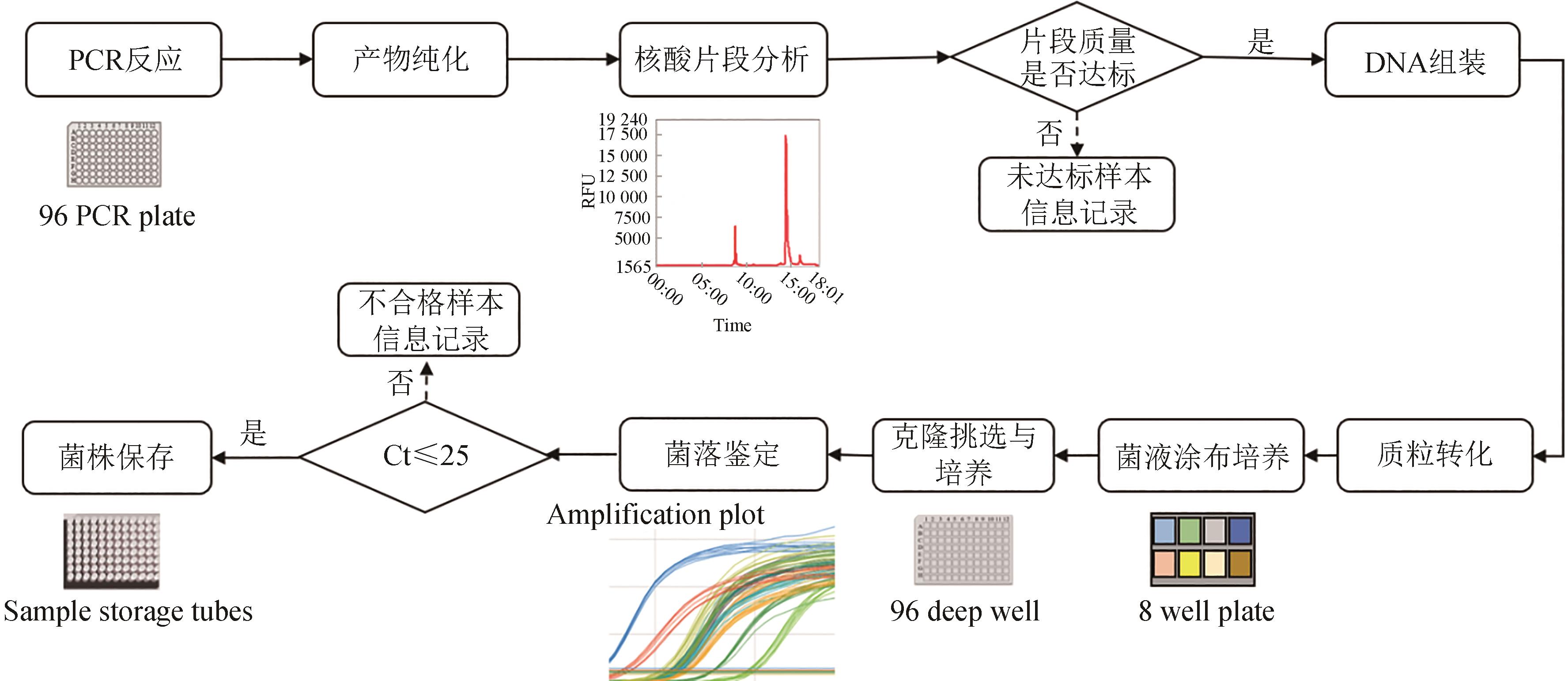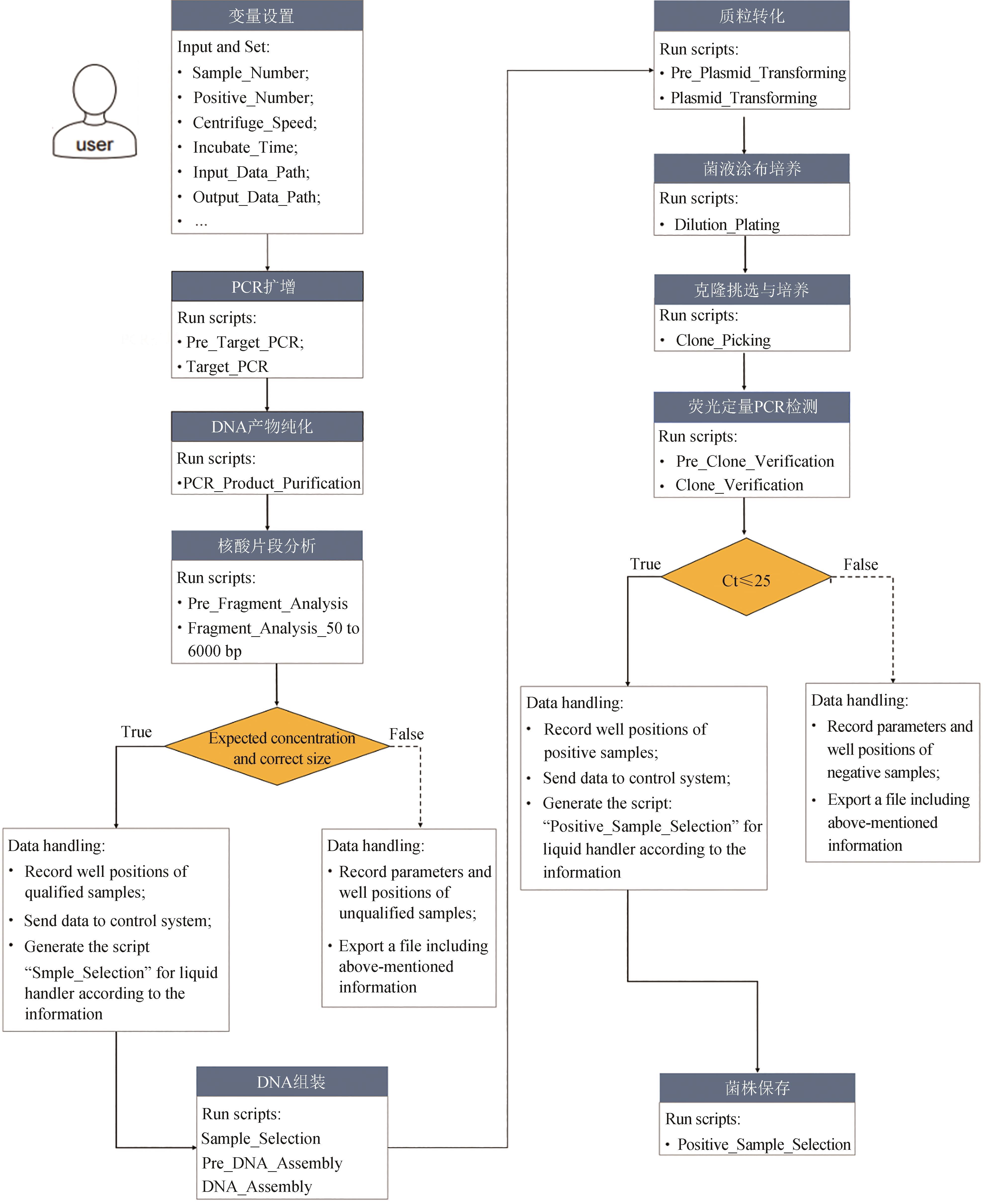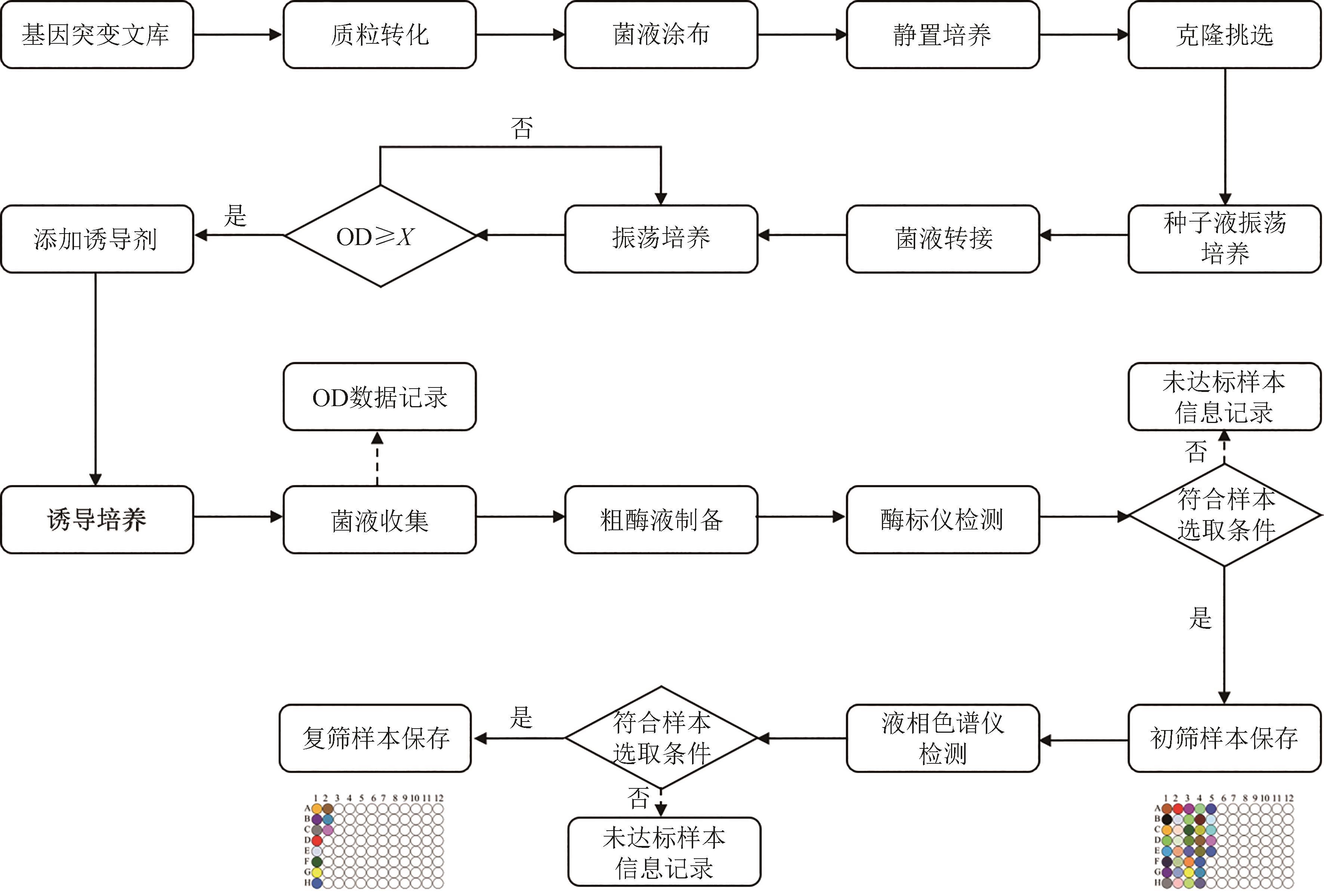Synthetic Biology Journal ›› 2023, Vol. 4 ›› Issue (5): 877-891.DOI: 10.12211/2096-8280.2023-027
• Invited Review • Previous Articles Next Articles
Establishment of iBioFoundry for synthetic biology applications
LU Hui1, ZHANG Fangli1, HUANG Lei1,2
- 1.ZJU-Hangzhou Global Scientific and Technological Innovation Center,Zhejiang University,Hangzhou 311215,Zhejiang,China
2.Institute of Bioengineering,College of Chemical and Biological Engineering,Zhejiang University,Hangzhou 310058,Zhejiang,China
-
Received:2023-03-31Revised:2023-05-24Online:2023-11-15Published:2023-10-31 -
Contact:HUANG Lei
合成生物学自动化装置iBioFoundry的构建与应用
卢挥1, 张芳丽1, 黄磊1,2
- 1.浙江大学杭州国际科创中心,杭州 浙江 311215
2.浙江大学生物工程研究所,化学工程与生物工程学院,浙江 杭州 310058
-
通讯作者:黄磊 -
作者简介:卢挥 (1994—),男,硕士,自动化装置工程师。研究方向为合成生物学。E-mail:luhui11@zju.edu.cn黄磊 (1977—),男,副教授,博士生导师。研究方向为代谢工程、合成生物学。E-mail:lhuangblue@zju.edu.cn
CLC Number:
Cite this article
LU Hui, ZHANG Fangli, HUANG Lei. Establishment of iBioFoundry for synthetic biology applications[J]. Synthetic Biology Journal, 2023, 4(5): 877-891.
卢挥, 张芳丽, 黄磊. 合成生物学自动化装置iBioFoundry的构建与应用[J]. 合成生物学, 2023, 4(5): 877-891.
share this article
Add to citation manager EndNote|Ris|BibTeX
URL: https://synbioj.cip.com.cn/EN/10.12211/2096-8280.2023-027
| 编号 | 子任务名称 | 实验步骤 | 需编程的设备 | 程序名称 |
|---|---|---|---|---|
| 1 | PCR反应 | PCR反应体系配置 | 移液工作站 | Pre_Target_PCR |
| 封膜 | ||||
| 离心 | ||||
| PCR扩增 | 自动化PCR仪 | Target_PCR | ||
| 2 | 产物纯化 | 撕膜 | ||
| 磁珠纯化 | 移液工作站 | PCR_Product_Purification | ||
| 3 | 核酸片段分析 | 核酸片段检测体系配置 | 移液工作站 | Pre_Fragment_Analysis |
| 核酸片段分析 | 自动化核酸片段分析仪 | Fragment_Analysis_50 to 6000 bp | ||
| 4 | DNA组装 | 样品筛选及试剂分装 | 移液工作站 | Sample_Selection |
| DNA组装反应体系配制 | 纳升级移液工作站 | Pre_DNA_Assembly | ||
| 封膜 | ||||
| 离心 | ||||
| DNA组装反应 | 自动化PCR仪 | DNA_Assembly | ||
| 5 | 质粒转化 | 撕膜 | ||
| 质粒转化体系配置 | 移液工作站 | Pre_Plasmid_Transforming | ||
| 封膜 | ||||
| 热激 | 自动化PCR仪 | Plasmid_Transforming | ||
| 孵育 | ||||
| 6 | 菌液涂布培养 | 8孔矩形培养板涂布 | 移液工作站 | Dilution_Plating |
| 平板静置培养 | ||||
| 7 | 克隆挑选与培养 | 培养基分装 | ||
| 克隆挑选 | 移液工作站 | Clone_Picking | ||
| 封膜 | ||||
| 菌液振荡培养 | ||||
| 8 | 菌落鉴定 | 荧光定量PCR反应体系配置 | 移液工作站 | Pre_Clone_Verification |
| 封膜 | ||||
| 离心 | ||||
| 荧光定量PCR检测 | 荧光定量PCR仪 | Clone_Verification | ||
| 9 | 菌株保存 | 开盖 | ||
| 菌株挑选与保存 | 移液工作站 | Positive_Sample_Selection | ||
| 关盖 | ||||
| 样本存储 |
Table 1 Relevant operation and involved scripts of the experiment
| 编号 | 子任务名称 | 实验步骤 | 需编程的设备 | 程序名称 |
|---|---|---|---|---|
| 1 | PCR反应 | PCR反应体系配置 | 移液工作站 | Pre_Target_PCR |
| 封膜 | ||||
| 离心 | ||||
| PCR扩增 | 自动化PCR仪 | Target_PCR | ||
| 2 | 产物纯化 | 撕膜 | ||
| 磁珠纯化 | 移液工作站 | PCR_Product_Purification | ||
| 3 | 核酸片段分析 | 核酸片段检测体系配置 | 移液工作站 | Pre_Fragment_Analysis |
| 核酸片段分析 | 自动化核酸片段分析仪 | Fragment_Analysis_50 to 6000 bp | ||
| 4 | DNA组装 | 样品筛选及试剂分装 | 移液工作站 | Sample_Selection |
| DNA组装反应体系配制 | 纳升级移液工作站 | Pre_DNA_Assembly | ||
| 封膜 | ||||
| 离心 | ||||
| DNA组装反应 | 自动化PCR仪 | DNA_Assembly | ||
| 5 | 质粒转化 | 撕膜 | ||
| 质粒转化体系配置 | 移液工作站 | Pre_Plasmid_Transforming | ||
| 封膜 | ||||
| 热激 | 自动化PCR仪 | Plasmid_Transforming | ||
| 孵育 | ||||
| 6 | 菌液涂布培养 | 8孔矩形培养板涂布 | 移液工作站 | Dilution_Plating |
| 平板静置培养 | ||||
| 7 | 克隆挑选与培养 | 培养基分装 | ||
| 克隆挑选 | 移液工作站 | Clone_Picking | ||
| 封膜 | ||||
| 菌液振荡培养 | ||||
| 8 | 菌落鉴定 | 荧光定量PCR反应体系配置 | 移液工作站 | Pre_Clone_Verification |
| 封膜 | ||||
| 离心 | ||||
| 荧光定量PCR检测 | 荧光定量PCR仪 | Clone_Verification | ||
| 9 | 菌株保存 | 开盖 | ||
| 菌株挑选与保存 | 移液工作站 | Positive_Sample_Selection | ||
| 关盖 | ||||
| 样本存储 |
| 类型 | 名称 | 数量 | 起始位置 | 结束位置 |
|---|---|---|---|---|
| 试剂 | 引物 | 2块 | 自动化低温冰箱1-[ | 6列耗材存储设备2-[ |
| DNA模板 | 1块 | 自动化低温冰箱1-[ | 6列耗材存储设备2-[ | |
| 大肠杆菌感受态细胞 | 1块 | 自动化低温冰箱1-[ | 耗材回收桶 | |
| PCR反应试剂 | 1块 | 自动化低温冰箱1-[ | 自动化低温冰箱1-[ | |
| DNA组装试剂 | 1块 | 自动化低温冰箱1-[ | 自动化低温冰箱1-[ | |
| qPCR检测试剂 | 1块 | 自动化低温冰箱1-[ | 自动化低温冰箱1-[ | |
| 耗材 | 50 μL黑色吸头 | 2盒 | 24列耗材存储设备1-[ | 耗材回收桶 |
| 200 μL黑色吸头 | 7盒 | 24列耗材存储设备2-[ | 耗材回收桶 | |
| 50 μL透明吸头 | 4盒 | 24列耗材存储设备1-[ | 耗材回收桶 | |
| 200 μL透明吸头 | 3盒 | 24列耗材存储设备3-[ | 耗材回收桶 | |
| 8孔矩形培养板 | 12块 | 10列耗材存储设备1-[ | 自动化低温冰箱2-[ | |
| 96孔微孔板 | 4块 | 24列耗材存储设备4-[ | 自动化低温冰箱1-[ | |
| 96孔深孔板 | 8块 | 10列耗材存储设备2-[ | 10列耗材存储设备2-[ | |
| 96位样本架 | 3块 | 6列耗材存储设备1-[ | Arktic冰箱 | |
| 384孔微孔板 | 4块 | 24列耗材存储设备4-[ | 6列耗材存储设备2-[ |
Table 2 Reagents and consumables used in experiment
| 类型 | 名称 | 数量 | 起始位置 | 结束位置 |
|---|---|---|---|---|
| 试剂 | 引物 | 2块 | 自动化低温冰箱1-[ | 6列耗材存储设备2-[ |
| DNA模板 | 1块 | 自动化低温冰箱1-[ | 6列耗材存储设备2-[ | |
| 大肠杆菌感受态细胞 | 1块 | 自动化低温冰箱1-[ | 耗材回收桶 | |
| PCR反应试剂 | 1块 | 自动化低温冰箱1-[ | 自动化低温冰箱1-[ | |
| DNA组装试剂 | 1块 | 自动化低温冰箱1-[ | 自动化低温冰箱1-[ | |
| qPCR检测试剂 | 1块 | 自动化低温冰箱1-[ | 自动化低温冰箱1-[ | |
| 耗材 | 50 μL黑色吸头 | 2盒 | 24列耗材存储设备1-[ | 耗材回收桶 |
| 200 μL黑色吸头 | 7盒 | 24列耗材存储设备2-[ | 耗材回收桶 | |
| 50 μL透明吸头 | 4盒 | 24列耗材存储设备1-[ | 耗材回收桶 | |
| 200 μL透明吸头 | 3盒 | 24列耗材存储设备3-[ | 耗材回收桶 | |
| 8孔矩形培养板 | 12块 | 10列耗材存储设备1-[ | 自动化低温冰箱2-[ | |
| 96孔微孔板 | 4块 | 24列耗材存储设备4-[ | 自动化低温冰箱1-[ | |
| 96孔深孔板 | 8块 | 10列耗材存储设备2-[ | 10列耗材存储设备2-[ | |
| 96位样本架 | 3块 | 6列耗材存储设备1-[ | Arktic冰箱 | |
| 384孔微孔板 | 4块 | 24列耗材存储设备4-[ | 6列耗材存储设备2-[ |
| 存储设备 | 设备内载架类型(高度) | 列数 | 板位数/列 | 功能 |
|---|---|---|---|---|
| 24列耗材存储设备 | 高位载架(69 mm) | 10列 | 7 plates | 可存放70盒SBS规格吸头盒 |
| 中位载架(50 mm) | 8列 | 10 plates | 可存放80块SBS规格深孔板 | |
| 低位载架(23 mm) | 6列 | 21 plates | 可存放126块SBS规格微孔板 | |
| 10列耗材存储设备 | 超高位载架(128 mm) | 2列 | 4 plates | 可存放8盒SBS规格吸头盒 |
| 中位载架(50 mm) | 5列 | 10 plates | 可存放50块SBS规格深孔板 | |
| 低位载架(23 mm) | 3列 | 21 plates | 可存放63块SBS规格微孔板 | |
| 6列耗材存储设备 | 高位载架(69 mm) | 2列 | 8 plates | 可存放16块SBS规格深孔板 |
| 低位载架(31 mm) | 4列 | 15 plates | 可存放60块SBS规格微孔板 |
Table 3 Automated consumable-storing devices and inner resource allocation
| 存储设备 | 设备内载架类型(高度) | 列数 | 板位数/列 | 功能 |
|---|---|---|---|---|
| 24列耗材存储设备 | 高位载架(69 mm) | 10列 | 7 plates | 可存放70盒SBS规格吸头盒 |
| 中位载架(50 mm) | 8列 | 10 plates | 可存放80块SBS规格深孔板 | |
| 低位载架(23 mm) | 6列 | 21 plates | 可存放126块SBS规格微孔板 | |
| 10列耗材存储设备 | 超高位载架(128 mm) | 2列 | 4 plates | 可存放8盒SBS规格吸头盒 |
| 中位载架(50 mm) | 5列 | 10 plates | 可存放50块SBS规格深孔板 | |
| 低位载架(23 mm) | 3列 | 21 plates | 可存放63块SBS规格微孔板 | |
| 6列耗材存储设备 | 高位载架(69 mm) | 2列 | 8 plates | 可存放16块SBS规格深孔板 |
| 低位载架(31 mm) | 4列 | 15 plates | 可存放60块SBS规格微孔板 |
| 1 | SISMOUR A M, BENNER S A. Synthetic biology[J]. Expert Opinion on Biological Therapy, 2005, 5(11): 1409-1414. |
| 2 | 张先恩. 中国合成生物学发展回顾与展望[J]. 中国科学:生命科学, 2019, 49(12): 1543-1572. |
| ZHANG X E. Synthetic biology in China: Review and prospects[J]. Scientia Sinica (Vitae), 2019, 49(12): 1543-1572. | |
| 3 | 赵国屏. 合成生物学: 开启生命科学 "会聚" 研究新时代[J]. 中国科学院院刊, 2018, 33(11)1135-1149 |
| ZHAO G P. Synthetic biology: unsealing the convergence era of life science research[J]. Bulletin of the Chinese Academy of Sciences, 2018, 33(11)1135-1149. | |
| 4 | CAMERON D E, BASHOR C J, COLLINS J J. A brief history of synthetic biology[J]. Nature Reviews Microbiology, 2014, 12(5): 381-390. |
| 5 | KHALIL A S, COLLINS J J. Synthetic biology: applications come of age[J]. Nature Reviews Genetics, 2010, 11(5): 367-379. |
| 6 | MARTIN V J J, PITERA D J, WITHERS S T, et al. Engineering a mevalonate pathway in Escherichia coli for production of terpenoids[J]. Nature Biotechnology, 2003, 21(7): 796-802. |
| 7 | WIN M N, SMOLKE C D. Higher-order cellular information processing with synthetic RNA devices[J]. Science, 2008, 322(5900): 456-460. |
| 8 | PADDON C J, WESTFALL P J, PITERA D J, et al. High-level semi-synthetic production of the potent antimalarial artemisinin[J]. Nature, 2013, 496(7446): 528-532. |
| 9 | CHAO R, MISHRA S, SI T, et al. Engineering biological systems using automated biofoundries[J]. Metabolic Engineering, 2017, 42: 98-108. |
| 10 | 唐婷, 付立豪, 郭二鹏, 等. 自动化合成生物技术与工程化设施平台[J]. 科学通报, 2021, 66(3): 300-309. |
| TANG T, FU L H, GUO E P, et al. Automation in synthetic biology using biological foundries[J]. Chinese Science Bulletin, 2021, 66(3): 300-309. | |
| 11 | LE FEUVRE R A, SCRUTTON N S. A living foundry for Synthetic Biological Materials: a synthetic biology roadmap to new advanced materials[J]. Synthetic and Systems Biotechnology, 2018, 3(2): 105-112. |
| 12 | KANG D H, KO S C, HEO Y B, et al. RoboMoClo: a robotics-assisted modular cloning framework for multiple gene assembly in biofoundry[J]. ACS Synthetic Biology, 2022, 11(3): 1336-1348. |
| 13 | SI T, CHAO R, MIN Y H, et al. Automated multiplex genome-scale engineering in yeast[J]. Nature Communications, 2017, 8: 15187. |
| 14 | CHAO R, LIANG J, TASAN I, et al. Fully automated one-step synthesis of single-transcript TALEN pairs using a biological foundry[J]. ACS Synthetic Biology, 2017, 6(4): 678-685. |
| 15 | STORCH M, HAINES M C, BALDWIN G S. DNA-BOT: a low-cost, automated DNA assembly platform for synthetic biology[J]. Synthetic Biology, 2020, 5(1): ysaa010. |
| 16 | 崔金明, 张炳照, 马迎飞, 等. 合成生物学研究的工程化平台[J]. 中国科学院院刊, 2018, 33(11): 1249-1257. |
| CUI J M, ZHANG B Z, MA Y F, et al. Engineering platforms for synthetic biology research[J]. Bulletin of the Chinese Academy of Sciences, 2018, 33(11): 1249-1257. | |
| 17 | HILLSON N, CADDICK M, CAI Y Z, et al. Building a global alliance of biofoundries[J]. Nature Communications, 2019, 10: 2040. |
| 18 | 晁然, 原永波, 赵惠民. 构建合成生物学制造厂[J]. 中国科学:生命科学, 2015, 45(10): 976-984. |
| CHAO R, YUAN Y B, ZHAO H M. Building biological foundries for next generation synthetic biology[J]. Scientia Sinica (Vitae), 2015, 45(10): 976-984. | |
| 19 | 张亭, 冷梦甜, 金帆, 等. 合成生物研究重大科技基础设施概述[J]. 合成生物学, 2022(1): 184-194. |
| ZHANG T, LENG M T, JIN F, et al. Overview on platform for synthetic biology research at Shenzhen[J]. Synthetic Biology Journal, 2022(1): 184-194. | |
| 20 | ZHANG J Z, CHEN Y C, FU L H, et al. Accelerating strain engineering in biofuel research via build and test automation of synthetic biology[J]. Current Opinion in Biotechnology, 2021, 67: 88-98. |
| 21 | WU F, JIN S T, JIANG Y H, et al. Pre-training of equivariant graph matching networks with conformation flexibility for drug binding[J]. Advanced Science, 2022, 9(33): 2203796. |
| 22 | WANG J, ZHANG X Q, CHENG L X, et al. An overview and metanalysis of machine and deep learning-based CRISPR gRNA design tools[J]. RNA Biology, 2020, 17(1): 13-22. |
| 23 | CARBONELL P, RADIVOJEVIC T, GARCÍA MARTÍN H. Opportunities at the intersection of synthetic biology, machine learning, and automation[J]. ACS Synthetic Biology, 2019, 8(7): 1474-1477. |
| 24 | ZHANG J, HANSEN L G, GUDICH O, et al. A microbial supply chain for production of the anti-cancer drug vinblastine[J]. Nature, 2022, 609(7926): 341-347. |
| 25 | CAI T, SUN H B, QIAO J, et al. Cell-free chemoenzymatic starch synthesis from carbon dioxide[J]. Science, 2021, 373(6562): 1523-1527. |
| [1] | GAO Ge, BIAN Qi, WANG Baojun. Synthetic genetic circuit engineering: principles, advances and prospects [J]. Synthetic Biology Journal, 2025, 6(1): 45-64. |
| [2] | LI Jiyuan, WU Guosheng. Two hypothesises for the origins of organisms from the synthetic biology perspective [J]. Synthetic Biology Journal, 2025, 6(1): 190-202. |
| [3] | JIAO Hongtao, QI Meng, SHAO Bin, JIANG Jinsong. Legal issues for the storage of DNA data [J]. Synthetic Biology Journal, 2025, 6(1): 177-189. |
| [4] | TANG Xinghua, LU Qianneng, HU Yilin. Philosophical reflections on synthetic biology in the Anthropocene [J]. Synthetic Biology Journal, 2025, 6(1): 203-212. |
| [5] | XU Huaisheng, SHI Xiaolong, LIU Xiaoguang, XU Miaomiao. Key technologies for DNA storage: encoding, error correction, random access, and security [J]. Synthetic Biology Journal, 2025, 6(1): 157-176. |
| [6] | SHI Ting, SONG Zhan, SONG Shiyi, ZHANG Yi-Heng P. Job. In vitro BioTransformation (ivBT): a new frontier of industrial biomanufacturing [J]. Synthetic Biology Journal, 2024, 5(6): 1437-1460. |
| [7] | CHAI Meng, WANG Fengqing, WEI Dongzhi. Synthesis of organic acids from lignocellulose by biotransformation [J]. Synthetic Biology Journal, 2024, 5(6): 1242-1263. |
| [8] | SHAO Mingwei, SUN Simian, YANG Shimao, CHEN Guoqiang. Bioproduction based on extremophiles [J]. Synthetic Biology Journal, 2024, 5(6): 1419-1436. |
| [9] | CHEN Yu, ZHANG Kang, QIU Yijing, CHENG Caiyun, YIN Jingjing, SONG Tianshun, XIE Jingjing. Progress of microbial electrosynthesis for conversion of CO2 [J]. Synthetic Biology Journal, 2024, 5(5): 1142-1168. |
| [10] | ZHENG Haotian, LI Chaofeng, LIU Liangxu, WANG Jiawei, LI Hengrun, NI Jun. Design, optimization and application of synthetic carbon-negative phototrophic community [J]. Synthetic Biology Journal, 2024, 5(5): 1189-1210. |
| [11] | CHEN Ziling, XIANG Yangfei. Integrated development of organoid technology and synthetic biology [J]. Synthetic Biology Journal, 2024, 5(4): 795-812. |
| [12] | CAI Bingyu, TAN Xiangtian, LI Wei. Advances in synthetic biology for engineering stem cell [J]. Synthetic Biology Journal, 2024, 5(4): 782-794. |
| [13] | XIE Huang, ZHENG Yilei, SU Yiting, RUAN Jingyi, LI Yongquan. An overview on reconstructing the biosynthetic system of actinomycetes for polyketides production [J]. Synthetic Biology Journal, 2024, 5(3): 612-630. |
| [14] | ZHA Wenlong, BU Lan, ZI Jiachen. Advances in synthetic biology for producing potent pharmaceutical ingredients of traditional Chinese medicine [J]. Synthetic Biology Journal, 2024, 5(3): 631-657. |
| [15] | HUI Zhen, TANG Xiaoyu. Applications of the CRISPR/Cas9 editing system in the study of microbial natural products [J]. Synthetic Biology Journal, 2024, 5(3): 658-671. |
| Viewed | ||||||
|
Full text |
|
|||||
|
Abstract |
|
|||||



